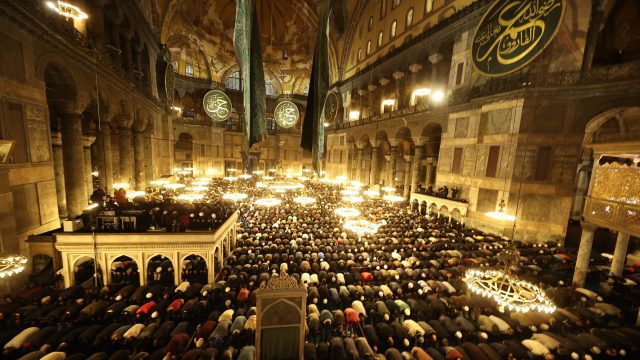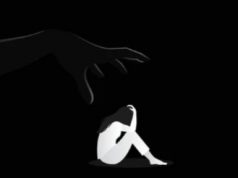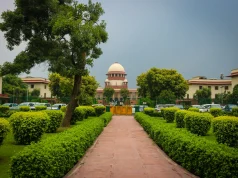Let us try to escape the bitter polemic that provocative displays against islam can legitimately arouse. Let us try to rid ourselves of the hasty surmises that polemical retort raises and fosters. Let us listen first of all to what modernity has to say for itself, how it defines itself.
The introduction of “modernity” as a concept has been linked to historical and societal transformations. Its origins can be traced back to a literary dispute that occurred in 17th century France, between the Ancients and the Moderns. Since that victorious epoch, and as a continuation of the Renaissance that aroused Europe from its medieval lethargy, modernity has become a lifestyle, a way of thinking, and a method of self-governance for Europeans. This is in stark contrast to the self-natured Middle Ages, a world engulfed in barbarism, eventually leading to colonization, predation, and public contempt. Modernity, at its core, bears reference to historical memory, fostering the perception of having made substantial strides from medieval Europe. The unquestionable superiority of the modern world is justified through advancements in scientific and technical fields, which serve as its argument against the archaic. It is this pretext that has been leveraged to justify and prove the cultural insignificance of the other and has paved the way for military and economic colonization of the southern world.
Renowned French sociologist Alain Touraine, in his Critique de la modernité, provides an analysis of modernity. He argues that modernity ignited humanity’s revolt against tradition, instilling a sense of sanctity in society by subjecting it to natural law and reason. In the context of Western civilization, modernity is the embodiment of reason itself, particularly apparent in science, technology, and education. The goal of modernist social politics should solely be to clear the path for reason by eliminating rules, corporatist defenses, or customs barriers.
At its core, eurocentric modernity represents a sacralization of the natural law of reason and requires full submission to its implications. To embrace modernity is to rebel against the divine. In this sense, modernity represents a shift towards reason, favoring a rejection of the sacred, and even the divine. This is seen in the insistence of modernist ideologies to clear the way, leading to a violent indictment of the irrational by armed and scientifically advanced technology.
Islam, in its essence, is submission to God. This submission is peaceful, non-violent towards others, and not egotistical. It is not a quest to eradicate others’ identities to pave the way for its majestic and exclusive progress. However, modernity, with its consistent progress and self-assured nature, poses a challenge to this peaceful submission. In the eyes of the Western world, tradition is currently embodied by Islam, which is viewed as an obscurantist force.
The West has lived its modernity as a revolution against its past. A history marked by conspiracies between the Church and ruling princes, fond of the privileges offered by a feudal system that reduced the populace to serfs and peasants. Eurocentric Modernity, reinforced by scientific and technical accomplishments, establishes itself as naturalistic and evolutionistic by nature, acknowledging no divinity other than reason and owing allegiance to nature alone.
The essence of Eurocentric modernity lies in the belief that society is the source of values, and that what is socially useful is good, and what is harmful to its uniformity and effectiveness is evil. Modernist thinking asserts the right of humans to live in a world governed by natural laws discovered by reason, to which reason itself is subject. This assertion displaces the divine and replaces it with society as the principle of moral judgment. Thus, the ideology of modernity redefines values, societal structures, and systems, reshaping humanity’s understanding of progress and rebellion against the sacred.
Eurocentric Modernity, relentless in its pursuit of uprooting the old, nurtured its impulse under the banner of rationality and progress. It held itself as the sole yardstick of truth, an absolute truth that laid waste to all that contradicted it. Its acceleration began with the Renaissance, gaining pace with the Scientific Revolution and philosophy. It was driven by a sharp and violent ideology that, once birthed, became a force capable of disrupting the very fabric of life.
This was not a simple, abstract idea that was confined to intellectual salons. It was a juggernaut that overturned concrete realities, severing ties with the past in its ruthless march. Old traditions were discarded, new ones instituted – by force, if necessary. This was the dawn of a new era, the age of modernity, a dynamic force of evolution and revolution.
The French Revolution, the industrial revolution, Napoleon’s bloody rule; each event became fuel for the fire that modernity was stoking. The conflagration spread far and wide, igniting the whole of Europe, paving the way for change. The Industrial Revolution, in particular, enabled Europe to amass wealth and build weaponry, making way for conflicts that were more modern – more lethal – than any before. This era of industrial capitalism required space to grow, to thrive. Thus, the need to dislodge old structures, to prune away the old world.
Eurocentric Modernity, in its pursuit of reason and progress, sought to sweep away any obstacles in its path. It stripped away protective structures like guilds, dismantled societal barriers, and dissolved customary defenses, all in the name of progress. Eurocentric Modernity made its mark early on, guided as much by philosophical thought as by mercantile ambitions.
Its effects were far-reaching, leading to colonial expansion, economic wars, and competitive struggles for resources. This modernist fervor, fueled by ideologies, technological advancements, and brutal mechanisms, is yet to exhaust its aggressive potential. In its global guise, it is more unrestrained, its capitalist tendencies running wild, unchecked.
In its zealous pursuit of progress, eurocentric modernity dismantled the structures that fostered communal ties and guild solidarity. The professional guilds, artisan associations, all united under the shade of the feudal order, were wiped out. The rule of capitalism, focused on efficiency and profitability, persisted, but the sense of solidarity, the communal spirit of the guilds, was lost.
Modernity was a juggernaut that flattened everything in its path, that replaced the religion of profit with the worship of the Supreme Being, which ousted the Church. This transformation led to the carving up of societies and then the world into colonial empires. The world was dissected and parceled out to the highest bidder, under the aegis of science and the guise of strategic conquest.
The two World Wars of the twentieth century were chilling reminders of modernity’s destructive potential. Unable to peacefully divide the colonial spoils, modern nations resorted to violence, sacrificing whole generations in a cutthroat contest of imperialisms. The race to develop the most efficient death-dealing mechanisms determined the victors.
Hitler’s war, a modern embodiment of progress and efficiency, was a harrowing demonstration of modernity’s potential for carnage. Hitler’s tanks, epitomes of technology in their time, served an ideologically driven, modernist fury. The Second World War and Hitler’s reign stand at the pinnacle of human suffering, a grim testament to modernity’s capacity for destruction.
Modernity is armed with three formidable weapons: the critical weapon of modernist ideology, the capitalist weapon worshiping profit, and the blunt tool of violence to clear the path for capitalism and its ideational establishment.
The most dangerous among these is the critical weapon of modernist ideology, which seeks to render all that is old as archaic, irrational, and fraudulent. Islam, founded on sacred revelation, bears the brunt of this ideological onslaught. Modernity seeks to erode its foundations by sowing seeds of doubt, by discrediting the divine revelation upon which Islam stands.
This is a war waged not on the battlefield but on the minds of people, a war aimed at hollowing out the soul, at supplanting faith with doubt. It is a cultural assault that leaves a society stripped of its essence, robbed of its intellectual and spiritual sustenance. The result is a generation reliant on the master of modernity for their intellectual sustenance, obedient vassals ready to execute their master’s commands.
The capitalist and military tools of modernity are merely instruments. The real war, the one waged on the hearts and minds of people, is far more insidious. It’s a total war, one that seeks to remake a civilization in the image of modernity, to reshape the very soul of a society. The wasteland left in the wake of this war is a desolate one, a world bereft of the warmth of human sympathy, a disenchanted wasteland of modernity.
In the face of escalating postmodernism, we find ourselves entangled in a global net of this advanced stage of modernity, a sharper thrust of the modernist enterprise than ever before. Spurred by international competition and unimpeded access to global markets, we find ourselves on the receiving end of this relentless ideological march.
We’ve become consumers of eurocentric modernity, either willingly or forcibly, serving as economical depositories for the harmful waste of modernity, a living lab for its experiments. We’ve all heard of the nefarious operations of European labs that test their drugs on people from Africa and the Global South, in the wake of testing on rodents. All for the sake of protecting the health of the white man.
Invasions on the lives of the poor and ‘insignificant’ populations extend beyond conventional mass killings; often, individuals from the South – frequently of Muslim faith – are expected to safeguard the life of the European by sacrificing their own life, usually without their knowledge. We’re captives of post-modernity, entrapped in its criminal grasp. Our blood, already spilled, is now sucked dry, tainted, exploited.
This has to stop! To halt this status quo, we must regain control of our destiny and engage with modernity as equals. We should seize those positive aspects of modernity that benefit us, without being blinded by the sparkle of post-modernity, or being overshadowed by modern advertising trying to sell us falsehoods at exorbitant prices.
Thus, we will acquire modernity, but on our terms. We should act as shrewd consumers of modernity, examining the product to detect flaws and expose the fraud. We ask such probing questions of modernity and demand a consideration of the past. Our plan to Islamize modernity begins with these questions and explorations, with the goal of demanding justice and equity from modernity.
Maintaining a sanctimonious front for the sake of appearing agreeable and friendly is futile if behind the scenes, we’re silencing awkward questions. Only through mutual candor, concern, and exceptional ‘transparency’ can we hope that Islam and modernity might someday cease to be a paradox, a contentious debate, and a fruitless conflict.
One day, when Western rejection has subsided, Islam, which will represent 40% of the world population by mid-next century, will emerge as an undeniable reality and its message indelible. We envision the Islamic world of tomorrow as an expansive horizon open to peaceful coexistence, respect for diverse cultures, and nature – which modern industrial and post-industrial society continue to pollute.
One day, the ‘post-post-period’ will be Islamic, because Islam is the Message of God (praise be to God!). The ongoing crisis of postmodernism will ultimately lead the inhabitants of this ailing planet to the brink, against the injustice endured by four-fifths of humanity: where business competition has escalated to the brink of nuclear threats, the ultimate show of force from the enraged giants. What global order, what international rules, what legal system, what UN, what ‘world policeman’ will prevent economic wars from exploding into uncontrollable firestorms?
Postmodernism will persist for some time; global neo-colonialism will resist the expansion of a new Islamic civilization. In the cutthroat race for profit, in the heightened demand for the energy controlled by Muslims, it won’t hesitate to shackle and counter anything of the sort. Western politicians, failing to recognize their long-term interest, only consider what’s immediately beneficial. Tough times await us, but God alone is powerful – may His name be exalted!
Eventually, it will be pointless to talk about an economy governed by justice, development that’s not predatory, and growth that respects humanity and the environment, without studying all that post-modernity entails. Meanwhile, we need to humbly commit ourselves to this task. The project of overcoming, ‘post-post,’ ultimately requires understanding and mastering the present. We’ll have to gradually adapt the harsh practices of this global jungle, progressively humanize them, and tame the savage brutality of globalization intent on destroying the biosphere and keeping four-fifths of humanity destitute so that a minority can luxuriate in wealth and flaunt their joyless opulence and bovine consumption.
We must remember that postmodernism is here for a while longer; global neocolonialism will resist the emergence of a new Islamic civilization. We’re destined for challenging times, but God alone is almighty – may our Lord and Protector’s name be exalted! The rise of a new, unified Islamic civilization, backed by material resources and young, dynamic human potential, is historically plausible. As the aging Western demography inevitably declines, the flourishing Islamic youth heralds a shift in the history of civilization.
Nothing will save the West – too wealthy and comfortable – from vanishing outright, if the institution of marriage and family life continues to be threatened. A sparse and (demographically speaking) weak population will not be able to uphold the dominant role the West aspires to play on the world stage. Rampant homosexuality, coupled with openly admitted diseases once deemed shameful, will ultimately bring a proud and complacent civilization to its knees. But for now, let’s put speculation to rest. Let’s divert our attention from prognostication to revelation. Otherwise, our discourse would be mere rambling.






